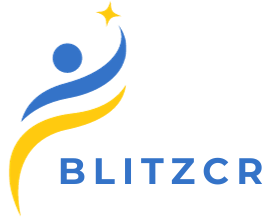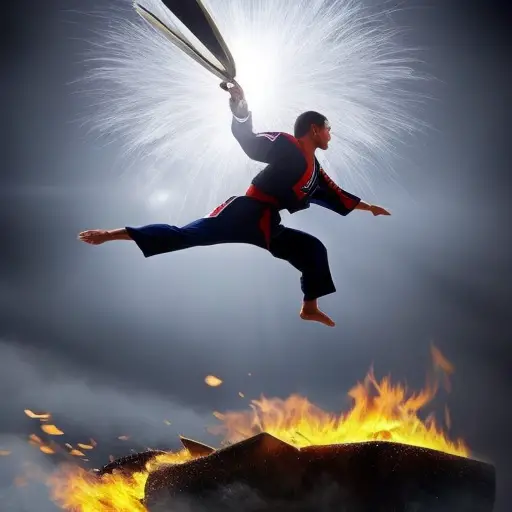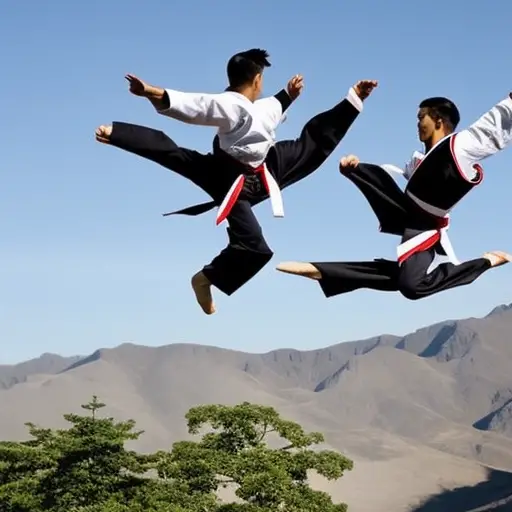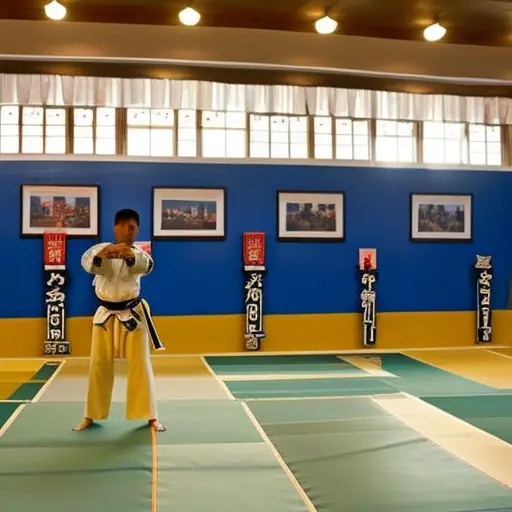Social Aspects of Being Part of a Taekwondo Dojang
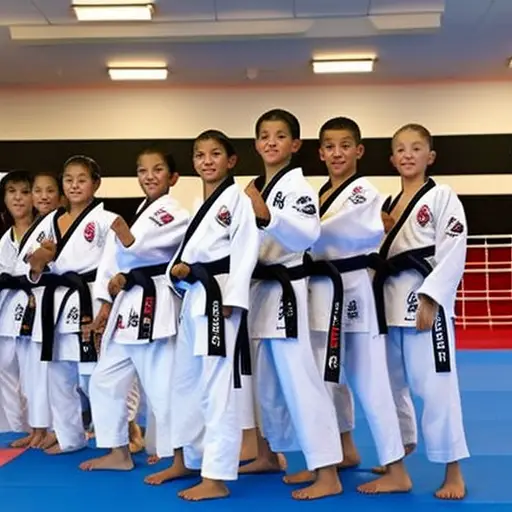
In the world of taekwondo, the physical discipline of mastering kicks, punches, and forms is often overshadowed by the powerful sense of community that emerges within the dojang.
It is a place where individuals from diverse backgrounds come together, forming lifelong friendships and supporting one another on their journey of personal growth.
In this article, we will explore the social aspects of being part of a taekwondo dojang, examining how it fosters collaboration, embraces diversity, and nurtures leadership skills.
Building a Supportive Community
In order to foster a sense of belonging and camaraderie among its members, building a supportive community within a Taekwondo Dojang is of utmost importance. This can be achieved through various team building activities and creating a safe environment for all participants.
Team building activities play a crucial role in creating a supportive community within a Taekwondo Dojang. These activities not only allow members to bond and develop trust with one another, but they also promote effective communication and collaboration. From group exercises that require cooperation to friendly competitions that encourage teamwork, these activities help members to understand the importance of supporting and uplifting each other.
Furthermore, creating a safe environment is essential in developing a supportive community within a Taekwondo Dojang. This involves establishing clear rules and guidelines that prioritize respect, empathy, and inclusivity. By ensuring that all members feel valued and protected, a safe environment fosters trust and encourages individuals to express themselves freely without fear of judgment or discrimination.
As members engage in team building activities and thrive in a safe environment, they are more likely to develop lifelong friendships. These friendships are built upon shared experiences, mutual support, and a sense of belonging. They provide a strong support system that extends beyond the training sessions, making the Taekwondo Dojang not just a place to learn martial arts, but a community where individuals can grow and flourish together.
Developing Lifelong Friendships
Not only do members of a Taekwondo Dojang have the opportunity to build a supportive community, but they also have the chance to develop lifelong friendships. The bonds formed in a Taekwondo Dojang can extend beyond the training sessions and create lasting connections that go beyond the martial art itself.
Friendship benefits in a Taekwondo Dojang are numerous. Firstly, being part of a supportive community fosters a sense of belonging and camaraderie, providing emotional support and motivation. This creates an environment where individuals feel comfortable and encouraged to push their limits and achieve their goals. Secondly, the shared experiences and challenges faced during training and competitions often create strong bonds between members. These connections are built on trust, respect, and mutual understanding, leading to long-lasting friendships. Lastly, the Dojang provides a platform for social interaction and networking, allowing individuals to meet people from different backgrounds and cultures, further enriching their social circle.
The following table outlines the friendship benefits and long-lasting connections that can be developed in a Taekwondo Dojang:
| Friendship Benefits | Long-lasting Connections |
|---|---|
| Emotional support | Shared experiences |
| Motivation | Trust and respect |
| Sense of belonging | Networking opportunities |
| Camaraderie | Cultural diversity |
Encouraging Teamwork and Collaboration
Encouraging teamwork and collaboration is a fundamental aspect of being part of a Taekwondo Dojang. Building strong bonds among practitioners fosters collective growth and enhances the overall experience within the dojang.
Building Strong Bonds
To foster a sense of camaraderie and unity, the dojang emphasizes the importance of teamwork and collaboration among its members. This is achieved through various team building activities and trust building exercises.
-
Regular group training sessions: Members are encouraged to train together in groups, allowing them to learn from each other, develop mutual respect, and build trust.
-
Partner drills: Practicing techniques with a partner requires cooperation and coordination, promoting teamwork and collaboration.
-
Team competitions: The dojang organizes friendly competitions where members form teams and compete against each other. This fosters a sense of unity and encourages members to work together towards a common goal.
Fostering Collective Growth
One of the key ways to foster collective growth within a taekwondo dojang is by promoting teamwork and collaboration among its members. Encouraging individuals to work together towards a common goal has numerous benefits, both for the individuals themselves and for the overall development of the dojang.
The advantages of teamwork in a taekwondo dojang are manifold. Firstly, it allows for the sharing of knowledge and skills among members, creating a supportive and nurturing environment. Through collaboration, more experienced practitioners can mentor and guide beginners, helping them to improve their techniques and progress in their practice. This mentoring benefits both the mentor and the mentee, as it enhances their understanding of the art and fosters a sense of responsibility and leadership.
Furthermore, teamwork in a taekwondo dojang promotes a sense of camaraderie and unity among its members. By working together towards common objectives, such as preparing for competitions or demonstrations, individuals build trust and develop strong relationships. This sense of belonging and support not only enhances the overall experience of being part of a dojang but also contributes to individual growth and personal development.
Fostering a Sense of Belonging
As individuals join a Taekwondo Dojang, they are able to foster a sense of belonging through active participation in group activities. The Dojang plays a crucial role in creating a welcoming environment that encourages camaraderie among its members.
-
Shared Goals: By engaging in regular training sessions and working towards common objectives, individuals in a Taekwondo Dojang develop a strong sense of belonging. They understand that they are part of a community that shares the same passion for martial arts and personal growth. This shared goal creates a bond that goes beyond the training mat and fosters a sense of unity.
-
Supportive Network: The Dojang serves as a support network for its members, offering encouragement and motivation. When facing challenges or setbacks, individuals can rely on their fellow practitioners for guidance and support. This network provides a sense of security and belonging, knowing that they are not alone in their journey.
-
Inclusive Culture: A Taekwondo Dojang embraces diversity and inclusivity, welcoming individuals from various backgrounds and skill levels. This inclusiveness fosters a sense of camaraderie, as members learn from one another and celebrate each other’s achievements. Regardless of age, gender, or experience, everyone is valued and respected within the Dojang community.
Embracing Diversity and Inclusion
The Taekwondo Dojang actively embraces diversity and inclusion, fostering a sense of unity and respect among its members. The promotion of equality and the fostering of inclusivity are key principles within the dojang community. Taekwondo is a martial art that originated in Korea, but it has since spread worldwide, attracting people from various backgrounds and cultures. In the dojang, individuals of different ages, genders, races, and abilities come together to train and learn. This diversity creates a rich and inclusive environment where everyone is welcomed and valued.
The dojang promotes equality by treating all members with fairness and respect, regardless of their differences. Discrimination and prejudice have no place within the dojang community. Instead, the focus is on fostering inclusivity, ensuring that each member feels accepted and supported. The dojang provides a safe space where individuals can express themselves freely and be their authentic selves.
By embracing diversity and inclusion, the Taekwondo Dojang not only promotes a sense of unity but also facilitates personal growth and self-confidence. When individuals feel accepted and valued for who they are, they can fully engage in their training and develop their skills. This sense of belonging and acceptance empowers individuals to push their limits and reach their full potential.
In the subsequent section, we will explore how the Taekwondo Dojang promotes personal growth and self-confidence among its members.
Promoting Personal Growth and Self-Confidence
To facilitate personal growth and self-confidence, the Taekwondo Dojang actively encourages members to challenge themselves and strive for excellence. This martial arts discipline provides a supportive and structured environment where individuals can embark on a journey of personal development and discover their true potential. Through rigorous training and the pursuit of mastery, participants can experience significant improvements in their self-esteem and overall well-being.
Here are three ways in which Taekwondo promotes personal growth and self-confidence:
-
Setting and achieving goals: Taekwondo offers a clear framework for progression through a belt system. As practitioners work towards earning higher belts, they set and achieve goals, developing a sense of accomplishment and enhancing their self-esteem.
-
Overcoming challenges: Taekwondo training involves various physical and mental challenges. By pushing themselves beyond their comfort zones and conquering these challenges, individuals develop resilience, build self-confidence, and realize their own strength and capabilities.
-
Positive reinforcement and support: In the Taekwondo Dojang, instructors and fellow students provide constant encouragement and support. This positive environment fosters a sense of belonging and boosts self-confidence, empowering individuals to push past their limits and achieve personal growth.
Nurturing Mentoring Relationships
Nurturing mentoring relationships within a Taekwondo dojang is essential for building supportive connections and fostering personal growth. These relationships provide a positive impact on individuals, offering guidance, support, and encouragement.
Building Supportive Connections
Within the context of a Taekwondo Dojang, fostering supportive connections is essential for the development of nurturing mentoring relationships. Building a strong support network within the dojang creates a positive environment where individuals can thrive and grow. This camaraderie helps to strengthen the bond between students and instructors, allowing for effective learning and personal development.
To build supportive connections in a Taekwondo Dojang, the following strategies can be implemented:
- Encouraging open communication: Providing a safe space for individuals to express their thoughts and concerns fosters trust and understanding among members of the dojang community.
- Promoting teamwork: Encouraging students to work together towards common goals helps to build a sense of unity and collaboration.
- Offering mentorship opportunities: Pairing experienced practitioners with beginners allows for the transfer of knowledge and skills, creating a supportive environment for learning and growth.
Mentorship’s Positive Impact
Through the cultivation of strong mentorship relationships, individuals within a Taekwondo Dojang can benefit from the positive impact of guidance and support from experienced practitioners.
Mentoring in a Taekwondo Dojang goes beyond teaching techniques and forms; it plays a crucial role in empowering individuals and enhancing self-discipline.
Mentors provide valuable insights, share personal experiences, and offer guidance on both physical and mental aspects of training. This mentorship fosters a sense of belonging and motivation, encouraging individuals to push beyond their limits and achieve their goals.
By having a mentor, individuals gain a role model to look up to, someone who has walked the path they aspire to follow. This helps build confidence and resilience, allowing individuals to overcome challenges and persevere in their Taekwondo journey.
As individuals grow within the Dojang and become more experienced, they develop the skills necessary to become mentors themselves, cultivating leadership skills that will benefit others in the Dojang community.
Cultivating Leadership Skills
As individuals progress in their Taekwondo journey, they can develop and enhance their leadership skills, thus becoming capable of guiding and inspiring others within the dojang. Taekwondo training provides a unique opportunity for individuals to cultivate and refine their leadership qualities.
The following are three key ways in which Taekwondo can help individuals develop their leadership skills:
-
Building Self-Confidence: Taekwondo requires individuals to push beyond their comfort zones and overcome challenges. Through this process, practitioners develop a sense of self-confidence that is essential for effective leadership. Confidence allows leaders to make decisions with conviction and inspire trust in their followers.
-
Fostering Discipline: Discipline is a fundamental aspect of Taekwondo training. Practitioners learn to adhere to strict rules, follow instructions, and maintain a strong work ethic. These disciplined habits translate into effective leadership skills, as leaders must demonstrate self-control, focus, and consistency in their actions.
-
Enhancing Communication Skills: Effective communication is crucial for successful leadership. Taekwondo emphasizes the importance of clear and concise communication between instructors and students. Through constant practice and interaction, individuals develop the ability to convey their thoughts, motivate others, and listen actively. These communication skills are transferable to various leadership roles, enabling individuals to effectively convey their vision and inspire others to achieve common goals.
Frequently Asked Questions
How Many Hours a Week Should I Expect to Train in a Taekwondo Dojang?
The number of hours you should expect to train in a taekwondo dojang depends on your personal goals and commitment level. However, regular practice, regardless of intensity, can provide numerous physical and mental benefits.
What Are the Specific Techniques and Moves Taught in a Taekwondo Dojang?
Taekwondo dojangs teach a range of kicking techniques and self-defense moves. These include front kicks, roundhouse kicks, and back kicks, as well as blocks, strikes, and joint locks. Mastering these techniques requires discipline, practice, and dedication.
Are There Any Age Restrictions for Joining a Taekwondo Dojang?
Age restrictions for joining a Taekwondo Dojang vary depending on the specific school and program. However, many dojangs offer classes for all age groups, providing numerous benefits such as improved physical fitness, discipline, and self-confidence.
Can I Participate in Tournaments and Competitions as a Member of a Taekwondo Dojang?
Yes, as a member of a Taekwondo Dojang, you can participate in tournaments and competitions. This provides numerous benefits such as improving skills, gaining experience, and fostering a competitive spirit.
What Is the Average Duration of Training Required to Achieve a Black Belt in Taekwondo?
What is the average duration of training required to achieve a black belt in taekwondo? Achieving a black belt in taekwondo typically requires several years of consistent training, with an average of 4-6 hours of training per week.
Conclusion
In conclusion, being part of a taekwondo dojang offers a range of social benefits.
It builds a supportive community where individuals can develop lifelong friendships and learn the importance of teamwork and collaboration.
The dojang fosters a sense of belonging, embraces diversity and inclusion, and promotes personal growth and self-confidence.
Additionally, it nurtures mentoring relationships and cultivates leadership skills.
Being part of a taekwondo dojang can be likened to a vibrant tapestry, weaving together individuals from different backgrounds into a unified and dynamic whole.
